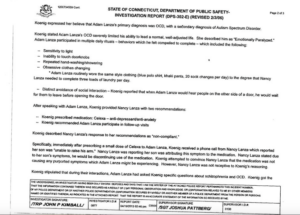The Arrest of Sandy Hook Killer’s Psychiatrist Raises a Host of Issues
Dr. Paul Fox, the primary psychiatrist for Sandy Hook shooter, Adam Lanza, has been charged with three felony counts of sexual assault on a then 19 year-old patient that reportedly occurred back in 2010-2011. Getting to Fox’s arrest has been a complicated journey, raising a host of issues that, frankly, need to be addressed.
First the original investigation, regarding accusations of sexual assault, was conducted four years ago in March of 2012 by the State of Connecticut Department of Public Health. During that investigation several important issues came to light, one of which involved Fox’s psychiatric drug prescribing practices.
According to the investigative file, over the course of one year, Fox prescribed what the victim called a “dynamic cocktail of psychiatric drugs.” The “constantly changing mix” of psychiatric drugs included: Ativan (anxiety), Saphris (bi-polar disorder), Abilify (schizophrenia), Nuvigil (sleep apnea, narcolepsy), Prozac (Major-depression, OCD), Zyprexa (Schizophrenia, bi-polar disorder), Xanax, and Vistaril (anxiety, tension). Vistaril also is used as a sedative and for general anesthesia.
After reviewing the above cocktail of psychiatric drugs, one can only wonder how anyone could even remotely believe the victim participated in “consensual” sex with Fox, especially in light of the victim’s comment that she was “usually drugged up out of (her) mind…” That is an understatement, and begs the question: if Fox is drugging his patient’s with cocktails of drugs, was Adam Lanza a victim of Fox’s prolific drugging? How many different psychiatric diagnoses did Fox subjectively bestow on Adam Lanza and what kind of psychiatric “dynamic cocktail” was Lanza prescribed while a “patient” under Fox’s “care.”
Tough to know. The State refuses to release Lanza’s mental health records or autopsy/toxicology results and Fox claims to have little memory of Lanza. Fox also claims to have destroyed his medical records prior to his 2012 departure to New Zealand. Apparently law enforcement never thought it important, at least, to review Fox’s billing records, which Fox claims still existed in December of 2012. So how about now? Has Fox retained the billing records of his patients and will law enforcement finally look at them?
This is an important question. When Fox surrendered his medical license in July 2012 he also agreed (as a condition of surrender) to adhere to the records retention laws of Connecticut (19a-14-44). Fox was required to retain all medical and billing records for patients up to seven years after the last date of “treatment.” If one accepts that Fox last saw Lanza in 2007, then Fox admits he destroyed Lanza’s “treatment” records two years too early. And, of course, one can only assume that the records of the alleged victim(s) of Fox’s reported sexual assault also have been destroyed.
Furthermore, one has to wonder what responsibility the Department of Health has when it comes to alleged sexual predators masquerading as doctors and working as counselors in the state’s universities. According to the investigation, the State Department of Health concluded that “review of the documentation identified exchanges between the patient and the respondent that exceed the boundaries of a professional doctor, patient relationship.”
But has the public health and welfare been served by allowing the doctor to simply surrender his license? Should the State be required to, at a minimum, report serious sexual assault allegations to local law enforcement?
And one simply cannot ignore what appears to be another questionable patient “treatment” problem which has arisen in New Zealand, where Fox fled to practice psychiatric counseling. Fox reportedly “treated” Nicky Stevens, a young man who died while under psychiatric care in New Zealand.
The questions regarding that case are too numerous to even consider. But one cannot help but question the obvious. If Fox surrendered his license to practice medicine and prescribe drugs in July of 2012, how was he allowed to practice psychiatric counseling and prescribe psychiatric drugs in New Zealand?
Additionally, Danbury State’s Attorney, Stephen Sedensky, will be prosecuting Fox’s case, because he tells Ablechild that the sexual assault charges are “the strongest.” But Ablechild cannot help but wonder why Sedensky, who, according to the Sandy Hook investigation, knew about the allegations of Fox’s sexual assault, the failure of Fox to retain his records and the questionable psychiatric drugging back in 2012, didn’t initiate an investigation of Fox at that time. The information, that was available in 2012, hasn’t changed.
These are important questions because there are victims of what appear to be blatant psychiatric abuses. These are important questions because, in the immediate aftermath of Sandy Hook, Connecticut lawmakers passed sweeping, costly, mental health legislation without having any information to warrant the increased mental health services.
In fact, based on what has been revealed in the Department of Health investigation about Dr. Paul Fox, Adam Lanza’s last known primary psychiatrist, it would appear that an investigation into psychiatric practices in the state were actually needed. And if ever there was an argument for release of Lanza’s mental health records for the five years leading up to the shooting, it doesn’t get any better than simply reviewing the long-known unquestionably abusive mental health services provided by Fox.




